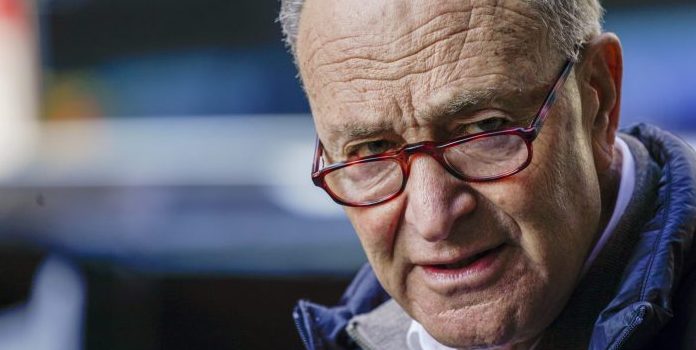(The Center Square) After weeks of stalling, Democratic leaders are finally expressing willingness to engage with Republicans in the government funding process – but they’re wielding Medicaid as a bargaining chip.
Congress has until Sept. 30 – the end of fiscal year 2025 – to pass all 12 annual appropriations bills that provide funding for federal agencies to spend on programs. If lawmakers do not pass all 12 in some form through both chambers of Congress, they risk a government shutdown.
Both chambers of Congress are in recess and will not return until September. But Senate Minority Leader Chuck Schumer, D-N.Y., and House Minority Leader Hakeem Jeffries, D-N.Y., sent a letter Monday to congressional Republican leaders, urging a so-called “Big Four” meeting to “discuss the government funding deadline and the health care crisis.”
“The Senate recently demonstrated that Congress is still able to achieve bipartisan appropriations legislation for the American people when the legislative process is permitted to work,” the lawmakers wrote, referring to the bipartisan passage of a “minibus” Friday night that combined three of the appropriations bills into one package.
“Today, we wish to reiterate that we should pursue a bipartisan path – you can work with us to protect health care for the American people and chart a better course for this country,” Schumer and Jeffries continued.
While Democrats are accusing Republicans of “rebuffing bipartisanship,” Republicans have accused them of acting based on “reflexive anti-Trump sentiment.”
Republicans originally planned to tackle the government funding process soon after the One Big Beautiful Bill Act became law in early July. Among hundreds of other policy changes, the massive budget reconciliation bill targets Medicaid fraud and abuse. It enforces work requirements on able-bodied adults without dependents, rescinds Medicaid eligibility for noncitizens residing illegally in the country, and cracks down on dual enrollment.
Despite Democratic concerns to the contrary, the changes do not make a dent in overall federal spending on Medicaid – which is still set to increase by more than $200 billion by 2034 – but merely slow spending growth. They also won’t kick any vulnerable populations off healthcare coverage, according to an analysis by the nonpartisan Congressional Budget Office.
But the partisan changes, combined with the partisan passage of a controversial $9 billion rescissions bill, alienated many Democrats. They proceeded to stall on confirming the rest of President Donald Trump’s civilian nominees – still a work in progress – and exerted pressure on Republicans to cave to more bipartisan appropriations demands.
Now, Schumer and Jeffries are continuing to press Senate Majority Leader John Thune, R-S.D., and House Speaker Mike Johnson, R-La., as the government shutdown deadline looms.
“As Leaders of the House and Senate, you have the responsibility to govern for all Americans and work on a bipartisan basis to avert a painful, unnecessary shutdown at the end of September,” they wrote. “Yet it is clear that the Trump Administration and many within your party are preparing to ‘go it alone’ and continue to legislate on a solely Republican basis.”
While the lawmakers have not yet laid out specific demands, their emphasis on the upcoming healthcare changes suggests Democrats will haggle for repealing as many Medicaid reforms in the OBBBA as possible.
The minibus still needs to receive House approval. If Congress is unable to pass all 12 appropriations bills by Sept. 30, they will likely pass a short-term Continuing Resolution, or CR, to keep government funding on cruise control until all appropriations bills are finalized. If the minibus (or other appropriations bills) pass both chambers by the deadline, the CR would apply to the remaining federal agencies.
If a CR happens, lawmakers will have punted on funding the government properly for the fourth time in a row. Congress never passed a fiscal year 2025 budget, instead passing three consecutive CRs to keep government funding on cruise control until Sept. 30.

